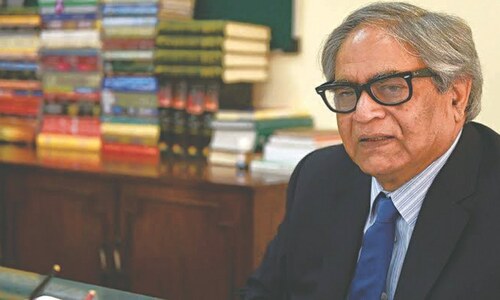RECENTLY, we have celebrated three consecutive years in the name of three distinguished literary personalities — N.M. Rashid, Faiz Ahmed Faiz, and Saadat Hasan Manto. We are in for another celebration in the coming months and preparations are already under way with the coming out of the volume Majeed Amjad: Aik Munfarid Awaz. We have been told by the compiler Khwaja Razi Haider that this volume has been brought out to mark the occasion of the birth centenary of the trendsetter poet, Majeed Amjad, who was born on June 29, 1914, and passed away on May 11, 1974.
The case of Majeed Amjad is a bit different from that of Rashid and Faiz. Though he emerged as a poet carrying the poetic trends of the decades of the ’30s and ’40s, Amjad did not associate himself with any movement, neither the Progressives nor the Modernists. He also did not try to keep in touch with the cities which were the hub of these movements and writers in general. Born in Jhang he eventually settled in Sahiwal where he was posted as assistant food controller. He took care to see that he was not transferred to any other city even if promoted and was content to move within the small circle of his poetry-loving friends and admirers in the small city. Leading a darvaish-like life he had hardly any ambitions, unlike many of his contemporaries, to become famous and come into the limelight as a poet.
In fact, it was only after his death that Amjad emerged as a major poet in the tradition of modern poetry. And for this the credit goes to his small circle of admirers. The poet’s death moved them deeply and with a deep devotion to him, they decided to collect all his writings and publish his collected works, to help people understand the real worth of Amjad’s poetry.
The present volume too should be seen in the same light. Haider has taken great pains to search and collect all that has been written about the poet’s life and works. The volume also includes a number of newly written articles. The material helps us see the man as he lived in the manner of a darvaish and what he was able to achieve in the field of poetry.
The writers in the book seem to acutely feel that Amjad did not get the kind of acknowledgement he deserved in accordance to his poetic achievements and they seem to be trying to compensate for that injustice. In addition, they also take on his unjust critics. Seeing Hameed Nasim being hostile in his criticism, Dr Khursheed Rizvi comes to Amjad’s rescue and pays him back in the same coin. Nazir Siddiqui had dared to say that the first 100 pages of Amjad’s Kulliyat offer no sign of any modernistic trend so Muzaffar Ali Syed stands in defence of the poet and points out this trend in a number of poems.
Muzaffar is perhaps right in saying that it was only after his death that Amjad attracted the attention of critics. Much was written about him after his death and soon a cult of his followers emerged. Dr Khursheed holds him as a mazloom poet who succeeded in winning the sympathies of kind-hearted people.
However, Syed tries to say that there is no use in harping on the theme of injustice meted out to the poet. Of course, he is very right in saying this. Is it indeed better to concentrate on the critical study of his poetry. With regards to comparing him to his contemporaries, Muzaffar seems to advise them to realise that Faiz, Rashid, Miraji, Mukhtar Siddiqui and Akhtarul Iman can be considered modern and sees no harm in comparing Amjad with them. What is required in this respect is a sense of restraint. “We,” says Syed, “need not make quick decisions.” Sane advice, of course.













































Dear visitor, the comments section is undergoing an overhaul and will return soon.